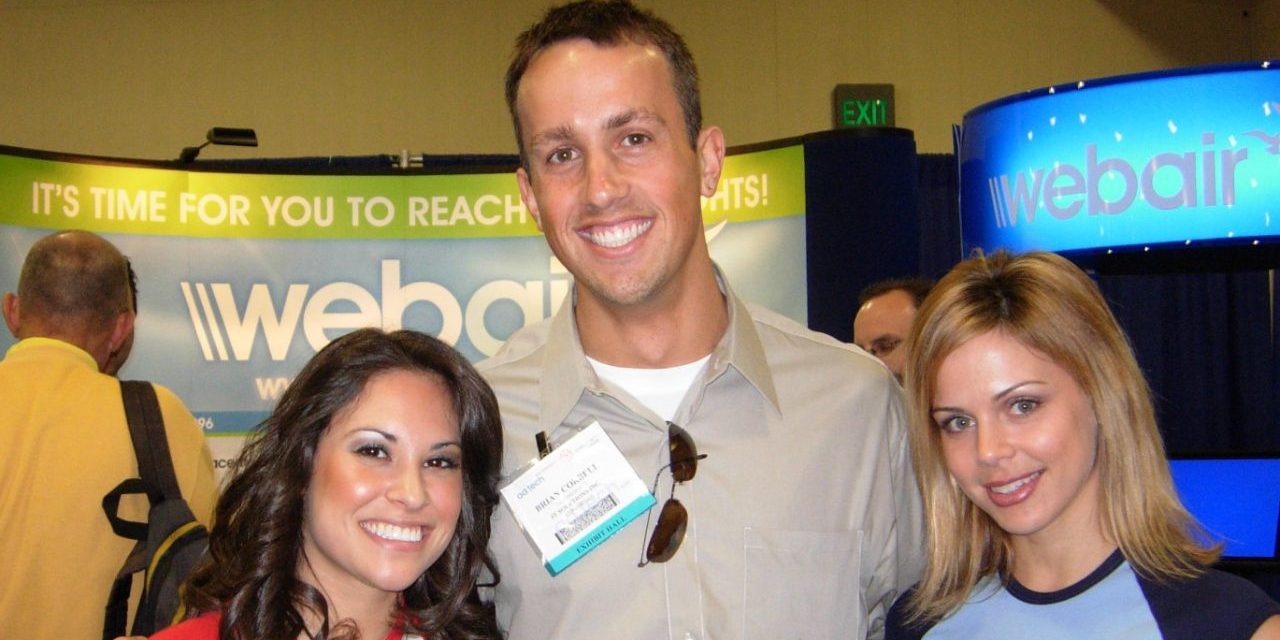Image: My son, Brian, taking a moment to relax at a technology event.
This site is dedicated to the memory of my cherished son:
Brian Charles Corbell
Jan. 17, 1980 – Sept. 17, 2019
My beloved and brilliant son, Brian — an expert in technology who suggested the creation of The Biz Coach in 2009 — passed away in the East Bay of San Francisco.
Brian’s passing — through no fault of his own — followed his long, courageous fight against the lethal, irreversible effects of fetal alcohol syndrome.
My fervent hope is that Brian’s tragic demise was not in vain – that awareness of fetal alcohol syndrome as explained by the Mayo Clinic – will spare others from such pain and suffering.
Brian was courageous much of his life as his health progressively worsened from countless debilitating ailments ranging from fibromyalgia to severe migraines.
Brian made me a very proud father
Starting with his courage, he was my hero with many exceptional qualities.
Extraordinarily brilliant and resourceful, he had a sunny optimism with a contagious, enthusiastic personality as he tried to maintain a healthy career-life balance.
He was community-minded, patriotic and he was an advocate for America’s free-enterprise system.
As a hard worker, he chased his passions.
But as the above picture shows, Brian took time to play even while attending technology conferences and conventions. He continuously sought knowledge in perfecting his craft as a brilliant tech visionary fueled by an inquiring mind.
He had gone back to school pursuing his dream of earning a Ph.D. to teach university students.
He loved dogs, fishing, water sports and technology.
Accomplished and innovative
Unquestioned in his thought-leadership, Brian frequently developed new concepts in technology.
He was working on his idea to make TV programs, especially sports, available on the Internet before we’d ever heard of the concept in the mid-2000s.
As an information-technology consultant, he solved tech issues for clients and he was adroit in fighting cybercrime. After uncovering security issues, he took down cybercriminals.
He was savvy in public relations and a master in the art of persuasion.
As a Microsoft Certified Partner, he once convinced Microsoft to discontinue its practice of charging a subscription fee for its antivirus and to provide it for free to Windows computer users.
As an entrepreneur and principal of IT Solutions, he once convinced Verizon to erect a cell-phone tower near his home-based business (at an estimated cost of $250,000).
Most recently, he was in supply-chain management, and marketing tech and other products on Amazon.com as a broker for global companies. Mindful of his Indian heritage, he formed NativeAmerican.org to market the products.
Early interest in technology
Brian enjoying a sailboat cruise on Commencement Bay in Washington.
As a youngster, in demonstrating his entrepreneurial chops, Brian mowed lawns and other income-producing activities. As a teenager, he managed a pizza parlor where his innovations significantly increased its profits. Years later he was a devotee of fantasy football in which he frequently won.
Brian developed his strong aptitude for unconventional problem-solving in technology by watching his favorite 1980’s TV program, MacGyver. (The story line of MacGyver: “The adventures of a secret Agent armed with almost infinite scientific resourcefulness.”)
During the summer months when he was a teenager, he accompanied me on client calls. I was hoping it would ultimately help him in his career development. My clients were impressed with him, but with his emerging ailments I thought he seemed hyperactive with a short attention span and was indifferent to my work.
So I was stunned years later when he became a successful IT consultant. When I asked how and why he accomplished his lofty career, he replied: “I actually paid attention when you took me on client calls.”
Dedicating this site to Brian
For more than eight years, I had been promoting my business, in part, by writing business-coaching tips as “The Biz Coach” for various news-media sites in Seattle and other markets.
But in early 2009, the tables were turned. My 20-something son gave me unsolicited advice: “Stop writing for the media and create your own biz-coach site.”
When I questioned his idea, he argued that the media sites were getting all the credit for my business strategies.
So, I caved and responded: “OK, son.” The Biz Coach debuted in July 2009.
Six months later, I realized how much he could inspire other young aspiring entrepreneurs — so, I interviewed him for an article:
Special Advice for Generation X & Y Tech Entrepreneurs
Jan 29, 2010 –
The Digital Age has been a catalyst for a whole new world of communication. Indeed, a lot has changed in technology even since I began writing the Biz Coach in Jan., 2001. And strange as it may seem, today is reminiscent of the Vietnam War era.
During the late 1960s and early 1970s baby boomers largely distrusted anyone over 30 years old. That, of course, was widely known as the Generation Gap. Now that baby boomers are considerably older than 30 and as parents with children and grandchildren, they now have another generation gap – with young Americans known as Generation X – anyone born from 1961 to 1981.
When baby boomers were teens or young adults, radio stations and their advertisers took them for granted, especially after 3 p.m. each weekday or on weekends. DJs were idolized by teenagers and stations were their main sources of information and entertainment.
But today’s generation gap gets worse. For the Y Generation, also known as Millennials who were born from 1978 to 2000, the media is even more irrelevant.
These younger Americans have so many other choices. So the radio industry is worried with good reason. iPods and MP3 players are all the rage. So is iTrip, a tiny FM car transmitter. It enables young folks to become broadcasters by playing their iPods through their car radios.
There is also great fear among some human resource managers about how best to communicate with Generation X and Y workers, especially when they show up in the workplace wearing earplugs while listening to music with a mindset that it’s their constitutional right to dance on the job.
So, like the Vietnam War era, a communication gap exists between the young and seasoned.
But, as with any generation, many in the X and Y Generations have entrepreneurial ambitions. What if they want business advice? How would it be best for me to communicate with them?
Well, to ensure this column is relevant, I turned to a successful Generation Y tech entrepreneur who has guest-lectured at the community college level. His name is Brian Corbell. Yep, he’s my son — an IT consultant in the Bay Area.
He says Generation X and Y would-be tech entrepreneurs like to ask questions.
Here are his answers to their typical dozen questions:
Q: What is the first thing I would need to do to start a business?
A: First, you must have an idea what you want to call the company. The company name must have a catchy name and slogan that people will remember. Sometimes being corny is a good idea, if it gets the point across. For instance, General Electric chose its name because of the nature of their business and their slogan is “imagination at work.”
Q: Do I need to incorporate?
A: Forming an LLC or LLP is highly recommended to protect your assets. Just because you have a corporation doesn’t mean the courts cannot pierce the corporate veil, it just makes it much more difficult if you play your cards right.
Q: How much money will it take to get my idea going?
A: Generally speaking the more liquidity the better, but $20,000 is about the right number to get what you need to accomplished.
Q: Do I need something in writing?
A: You should have your business plan around 15 pages in length, as well as a one-page vision plan with your goals up to five years and what you are going to do to accomplish those goals.
Q: What do I need legally to protect my IP?
A: In order to protect your intellectual property you should consider a trademark and copyright. Those are pretty reasonable in cost, and there are many internet sites which will do those for less than $500 each. Patents are an excellent idea, however, a good patent attorney can cost you 10-20K without blinking an eye. You should consider your investments wisely when making these types of decisions
Q: What do I need to do legally?
A: You should go see a local attorney and pay him/her a consultation fee for their recommendations.
Q: What about accounting?
A: Go see a local CPA to determine your tax liabilities. It might be a good idea to see a tax attorney instead of paying for two professionals.
Q: What about an Internet presence?
A: In today’s world, having email and at least a simple Web site is required in any successful organization. Email is universally considered to be 100 percent legal in stature, so be careful what you write. NTT/VERIO is highly rated for hosting small business customers with high availability and good customer service.
Q: Communication devices?
A: A landline in today’s marketplace is almost a thing of the past. But I would highly recommend a landline for the important calls for quality as well as being in the yellow pages. If you have a landline you get a one line free directory listing of your company in 411 and the local yellow pages. VoIP is growing in quality and demand which is a good idea if you’re a tech company as well as capitalizing on cheaper phone calls. I would recommend keeping a landline for emergencies (911) and in case of your Internet line going down. Cell phones are also a must in today’s world; you might wish to consider getting a PDA such as Motorola Q by Verizon Wireless or Sprint-Nextel Blackberry.
Q: Finances?
A: A separate bank account with complete records is a must. You should also consider getting a corporate credit card to build your business credit including separating your finances.
Q: Technology?
A: You should have a PDA type device, laptop, computer, and data server somewhere with onsite and offsite backup. I would recommend hosting your email in house to protect security if you can afford the expense.
Q: What about an office?
A: Offices are not required, many large corporations have people working from home. If you choose this route, a separate workspace is a good idea.
__________
Epilogue
On Sept. 14, 2019, Brian emailed me that he was “fighting migraines.”
I responded:
“Oh son!! Wish I knew what could be done. I love you, Brian, so very proud of you!! And yes, you are the CHAMP!!”
-Dad
On Sept. 23, a director at a funeral home called me: “Your son passed away six days ago.”
Brian had passed away three days after I last emailed him. Thank God Brian knew I loved him as the CHAMP.
(Please note: There are an estimated 33 million alcoholics in America. It tears families apart, and hurts taxpayers and businesses. In an effort to spare businesses the pain of alcoholism, I’ve published these strategies.)
__________








Terry, your son was so very blessed to have you as his father, and though this comment comes long afterward (I just learned), I am so deeply sorry for your loss. Thank you for sharing so much about him. Love the way you have honored him, and thank you for sharing.
Thank you, Sheri. You’re very kind.
I am sure your Son knew you loved him and that you were proud of him long before the email stated so. Thank you for sharing your story, and his. I will be sure to follow your site. So happy we got the opportunity to talk today. Give your Mother a hug for me.
Thank you, Krystal. Also, I enjoyed your service and fine work.
I came across this site while preparing for the job interview. I was looking for advise on Uncertainties in Project Management.
Thank you for sharing your story. Brian was beautiful and inspirational person. He carries on living through your site helping to make difference to the lives of others.
All the best,
Svitlana
Thank you, Svitlana, for your gracious comment. Wishing you continued success in all your endeavors.
Thank you for sharing that. I am glad that he knew you were proud of him and it sounds like you really loved him as well.
Thank you, Colby.
Thank you, Larry.
He was lucky to have you as a father. I wish you all the best and hope you eventually find some healing to the grief I cannot image you must feel. The world is obviously better for your giving him the life he lived, short as it was.